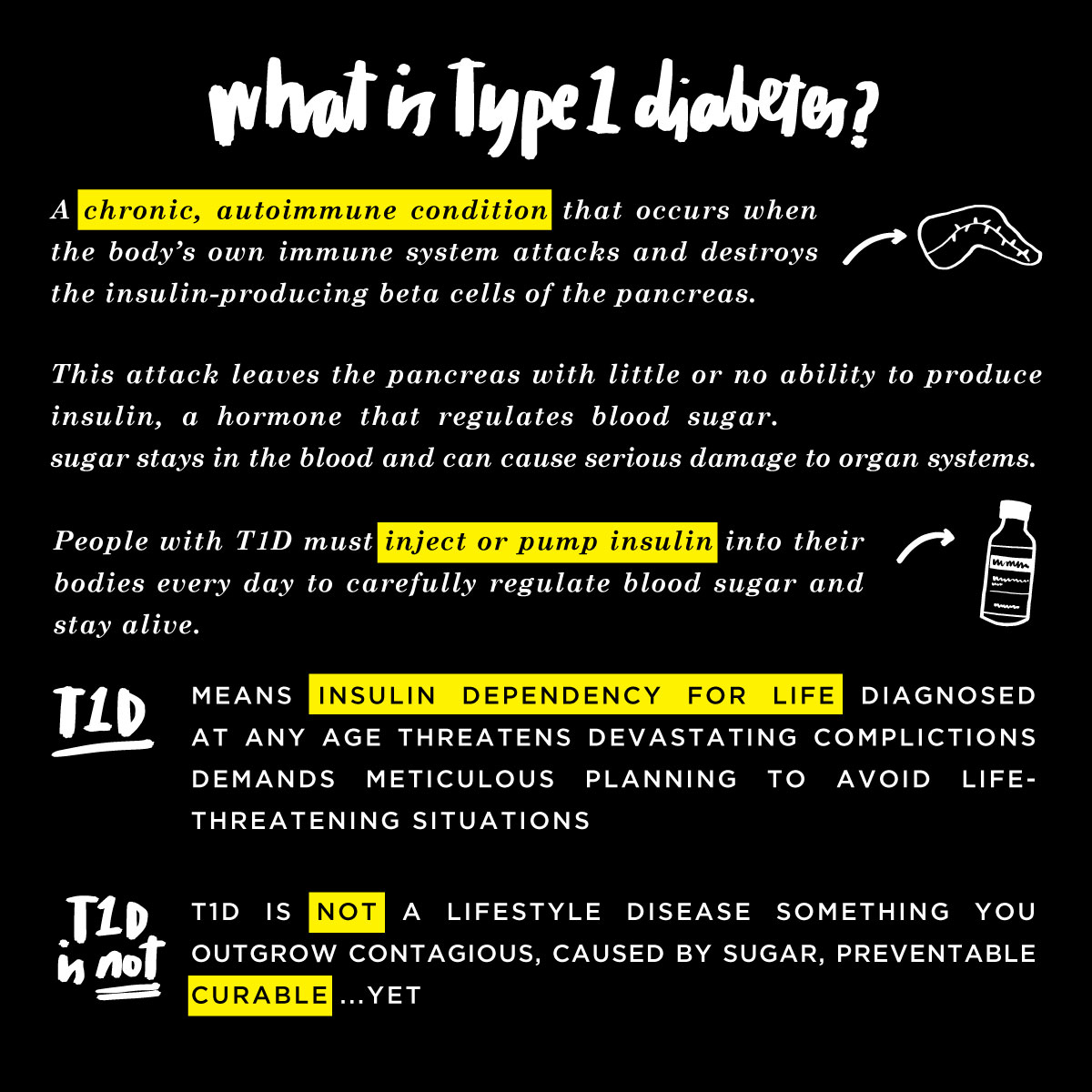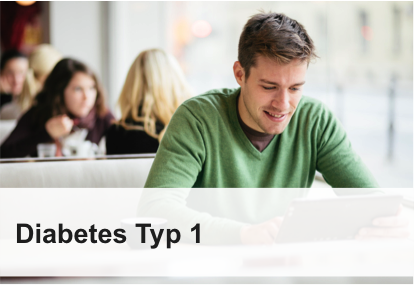Diabetes Typ 1

Type1diabetes. type1diabetes (previously known as insulin-dependent, juvenile or childhood-onset) is characterized by deficient insulin production and requires daily administration of insulin. neither the cause of type 1 diabetes nor the means to prevent it are known. No matter how type 1 diabetes has shown up in your life, you can find success by balancing your medications, and sticking to your daily exercise routine and nutrition plan. but wherever you’re at with this challenge, you can always reach out for help of any kind—from your caregivers, your family, or other people who live with type 1 diabetes. People with type 1 diabetes the autoimmune form of the disease are three-and-a-half times more likely to die if they catch covid-19 than non-diabetics, while type 2 diabetics those.
Type1diabetes happens when your immune system destroys cells in your pancreas that make insulin. learn more about the symptoms, causes, diagnosis, treatment, and complications of type 1 diabetes. About diabetes, type 1: type 1 diabetes mellitus, more commonly known as type 1 diabetes, is a disease in which the pancreas produces too little insulin to meet the body's needs. insulin is a hormone that helps control the level of glucose in the blood. glucose is the main form of sugar in the body.
Whats The Difference Between Type 1 And Type 2 Diabetes
Diabetestype1 and type 2 facts. diabetes is a chronic condition associated with abnormally high levels of sugar (glucose) in the blood. insulin produced by the pancreas lowers blood glucose. absence or insufficient production of insulin, or an inability of the body to properly use insulin causes diabetes. the two types of diabetes are referred to as type 1 and type 2. More diabetes typ 1 images.
Type 1 diabetes is also called insulin-dependent diabetes. it used to be called juvenile-onset diabetes, because it often begins in childhood. type 1 diabetes is an autoimmune condition. it happens. Type1diabetes (t1d), previously known as juvenile diabetes, is a form of diabetes in which very little or no insulin is produced by the pancreas. insulin is a hormone required for the body to use blood sugar. before treatment this results in high blood sugar levels in the body. the classic symptoms are frequent urination, increased thirst, increased hunger, and weight loss.
Diabetes Who
In september 2016, the food and drug administration approved the first artificial pancreas for people with type 1 diabetes who are age 14 and older. it's also called closed-loop insulin delivery. the implanted device links a continuous glucose monitor, which checks blood sugar levels every five minutes, to an insulin pump. Type1 and type 2 diabetes may have similar names, but they are different diseases with unique causes. causes of type 1 diabetes. the body’s immune system is responsible for fighting off foreign. In most people with type 1 diabetes, the body’s immune system, which normally fights infection, attacks and destroys the cells in the pancreas that make insulin. as a result, your pancreas stops making insulin. without insulin, glucose can’t get into your cells and your blood glucose rises above normal.
This guide is for adults with type 1 diabetes. there's separate information about type 2 diabetes. diabetes advice during the coronavirus outbreak. updates about coronavirus from diabetes uk; nhs helpline for adults who use insulin: call 0345 123 2399 (monday to friday from 9am to 6pm) online courses and advice from my type 1 diabetes. Type 1 diabetes (previously called insulin-dependent or juvenile diabetes) is usually diagnosed in children, teens, and young adults, but it can develop at any age. type 1 diabetes is less diabetes typ 1 common than type 2 —approximately 5-10% of people with diabetes have type 1.
The type 1 diabetes self-care manual can help you navigate any challenge with confidence. the manual covers everything, from blood sugar goals to complications and special considerations by age. Type1diabetes is less common than type 2—approximately 5-10% of people with diabetes have type 1. currently, no one knows how to prevent type 1 diabetes, but it can be managed by following your doctor’s recommendations for living a healthy lifestyle, managing your blood sugar, getting regular health checkups, and getting diabetes self.
9 Symptoms Of Type 1 Type 2 Diabetes Complications
See more videos for diabetes typ 1. Type1diabetes used to be called “juvenile diabetes” because type 2 was so rare in children. now that more children are overweight or obese type 2 diabetes is becoming more common in this. In people with type 1 diabetes, your immune system is constantly attacking the beta cells produced by your pancreas diabetes typ 1 that are essential for producing insulin. while your diagnosis may have been years or decades ago, your body still tries every single day to produce insulin.
Types of diabetes. there are three main types of diabetes: type 1, type 2, and gestational diabetes (diabetes while pregnant). type 1 diabetes. type 1 diabetes is thought to be caused by an autoimmune reaction (the body attacks itself by mistake) that stops your body from making insulin. Type1diabetes can pose some challenges in the workplace. for example, if you work in a job that involves driving or operating heavy machinery, hypoglycemia could pose a serious risk to you and those around you. you may need to work with your doctor and your employer to ensure that certain accommodations are made, such as additional breaks for. Type1diabetes mellitus (formerly known as insulin-dependent diabetes or juvenile diabetes) is a condition in which the body stops making insulin. this causes the person's blood glucose level (blood sugar) to increase. ; there are two types of diabetes, type 1 and type 2. ; in type 1 diabetes, the immune system attacks the pancreas, which causes the pancreas to stop producing insulin. Type 1 diabetes (t1d), previously known as juvenile diabetes, is a form of diabetes in which very little or no insulin is produced by the pancreas. insulin is a hormone required for the body to use blood sugar. before treatment this results in high blood sugar levels in the body.
Type1diabetes Symptoms Causes Treatment

The type 1 diabetes self-care manual will help guide you through the different phases of life with type 1 diabetes so you can face these challenges with confidence. written by drs. jamie wood and anne peters, two of the leading experts on diabetes clinical care, the manual covers all aspects of type 1 diabetes. topics discussed include: basics. People with type 1 diabetes need to take insulin every day to stay alive. people with type 1 diabetes need to take insulin every day. who is more likely to develop type 1 diabetes? type 1 diabetes typically occurs in children diabetes typ 1 and young adults, although it can appear at any age. Type 2 diabetes is often milder than type 1. but it can still cause major health complications, especially in the tiny blood vessels in your kidneys, nerves, and eyes. type 2 also raises your risk.
Type 1 diabetes wikipedia.
Type 1 diabetes, once known as juvenile diabetes or insulin-dependent diabetes, is a chronic condition in which the pancreas produces little or no insulin. insulin is a hormone needed to allow sugar (glucose) to enter cells to produce energy. different factors, including genetics and some viruses, may contribute to type 1 diabetes. Causes of type 1 diabetes the body’s immune system is responsible for fighting off diabetes typ 1 foreign invaders, like harmful viruses and bacteria. in people with type 1 diabetes, the immune system mistakes.
The following studies and treatment methods to cure type 1 diabetes have not moved beyond diabetes typ 1 curing type 1 diabetes in mice. if these attempts at curing type 1 diabetes progress to human trials, and are able to pass phases 1 through 4 of clinical trials, these approaches to curing type 1 diabetes are still a minimum of 20 years away from bringing. Type1 and type 2 diabetes both relate to the body’s use of insulin, but they have different causes and treatment. find out here about the differences and similarities, including the symptoms.
Comments
Post a Comment